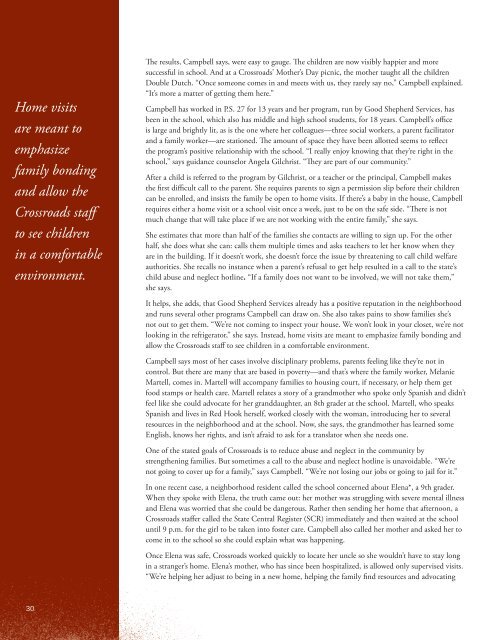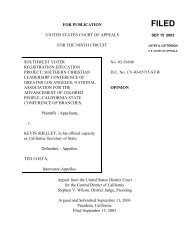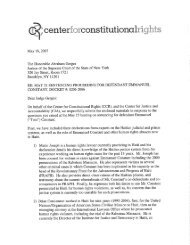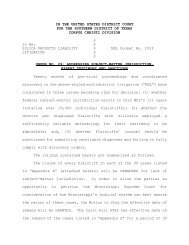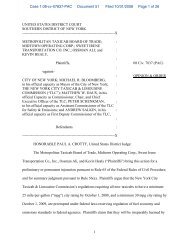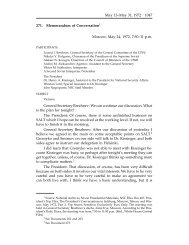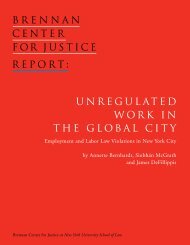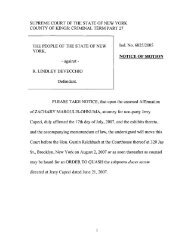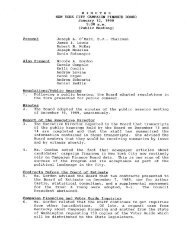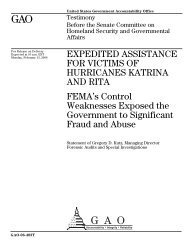Strengthening Schools by Strengthening Families
Strengthening Schools by Strengthening Families
Strengthening Schools by Strengthening Families
Create successful ePaper yourself
Turn your PDF publications into a flip-book with our unique Google optimized e-Paper software.
Home visits<br />
are meant to<br />
emphasize<br />
family bonding<br />
and allow the<br />
Crossroads staff<br />
to see children<br />
in a comfortable<br />
environment.<br />
30<br />
The results, Campbell says, were easy to gauge. The children are now visibly happier and more<br />
successful in school. And at a Crossroads’ Mother’s Day picnic, the mother taught all the children<br />
Double Dutch. “Once someone comes in and meets with us, they rarely say no,” Campbell explained.<br />
“It’s more a matter of getting them here.”<br />
Campbell has worked in P.S. 27 for 13 years and her program, run <strong>by</strong> Good Shepherd Services, has<br />
been in the school, which also has middle and high school students, for 18 years. Campbell’s office<br />
is large and brightly lit, as is the one where her colleagues—three social workers, a parent facilitator<br />
and a family worker—are stationed. The amount of space they have been allotted seems to reflect<br />
the program’s positive relationship with the school. “I really enjoy knowing that they’re right in the<br />
school,” says guidance counselor Angela Gilchrist. “They are part of our community.”<br />
After a child is referred to the program <strong>by</strong> Gilchrist, or a teacher or the principal, Campbell makes<br />
the first difficult call to the parent. She requires parents to sign a permission slip before their children<br />
can be enrolled, and insists the family be open to home visits. If there’s a ba<strong>by</strong> in the house, Campbell<br />
requires either a home visit or a school visit once a week, just to be on the safe side. “There is not<br />
much change that will take place if we are not working with the entire family,” she says.<br />
She estimates that more than half of the families she contacts are willing to sign up. For the other<br />
half, she does what she can: calls them multiple times and asks teachers to let her know when they<br />
are in the building. If it doesn’t work, she doesn’t force the issue <strong>by</strong> threatening to call child welfare<br />
authorities. She recalls no instance when a parent’s refusal to get help resulted in a call to the state’s<br />
child abuse and neglect hotline. “If a family does not want to be involved, we will not take them,”<br />
she says.<br />
It helps, she adds, that Good Shepherd Services already has a positive reputation in the neighborhood<br />
and runs several other programs Campbell can draw on. She also takes pains to show families she’s<br />
not out to get them. “We’re not coming to inspect your house. We won’t look in your closet, we’re not<br />
looking in the refrigerator,” she says. Instead, home visits are meant to emphasize family bonding and<br />
allow the Crossroads staff to see children in a comfortable environment.<br />
Campbell says most of her cases involve disciplinary problems, parents feeling like they’re not in<br />
control. But there are many that are based in poverty—and that’s where the family worker, Melanie<br />
Martell, comes in. Martell will accompany families to housing court, if necessary, or help them get<br />
food stamps or health care. Martell relates a story of a grandmother who spoke only Spanish and didn’t<br />
feel like she could advocate for her granddaughter, an 8th grader at the school. Martell, who speaks<br />
Spanish and lives in Red Hook herself, worked closely with the woman, introducing her to several<br />
resources in the neighborhood and at the school. Now, she says, the grandmother has learned some<br />
English, knows her rights, and isn’t afraid to ask for a translator when she needs one.<br />
One of the stated goals of Crossroads is to reduce abuse and neglect in the community <strong>by</strong><br />
strengthening families. But sometimes a call to the abuse and neglect hotline is unavoidable. “We’re<br />
not going to cover up for a family,” says Campbell. “We’re not losing our jobs or going to jail for it.”<br />
In one recent case, a neighborhood resident called the school concerned about Elena*, a 9th grader.<br />
When they spoke with Elena, the truth came out: her mother was struggling with severe mental illness<br />
and Elena was worried that she could be dangerous. Rather then sending her home that afternoon, a<br />
Crossroads staffer called the State Central Register (SCR) immediately and then waited at the school<br />
until 9 p.m. for the girl to be taken into foster care. Campbell also called her mother and asked her to<br />
come in to the school so she could explain what was happening.<br />
Once Elena was safe, Crossroads worked quickly to locate her uncle so she wouldn’t have to stay long<br />
in a stranger’s home. Elena’s mother, who has since been hospitalized, is allowed only supervised visits.<br />
“We’re helping her adjust to being in a new home, helping the family find resources and advocating


